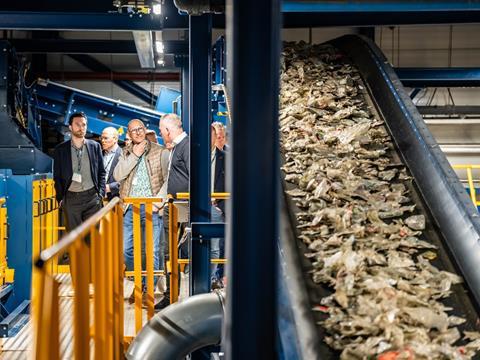
After the Grand Opening of its Cirrec plant in Duiven, Faerch Group aims to process used PET trays from household waste in Benelux, Germany, and Sweden at an input capacity of 60,000 tonnes – aiming to ensure that 3 billion items of rigid food packaging it sells yearly are ‘truly circular’.
Over five years of investment, Faerch has industrialized its Cirrec technology in a bid to keep recyclable plastic packaging out of landfills and incineration, instead treating it as a valuable asset for repeated use.
Speaking at the Grand Opening, business leader and climate and equalities campaigner Paul Polman encouraged businesses to adopt a Net Positive approach. This would require businesses to take a leadership role and contribute more to social and environmental causes than they take.
Faerch describes Net Positive as a ‘long-term aspiration’ for the company in its efforts to develop a circular tray material for the packaging industry.
Reportedly, approximately 106 billion pieces and 400,000 tonnes of rigid food packaging enter the market every year; 90% of it is thought to end up in landfills or incineration.
Claiming to hold a 20% market share, Faerch anticipates that 3 billion of around 24 billion products it sells every year will be ‘truly circular’. Around 13% of its sold items are said to have achieved circularity at present, with the company setting its sights on 100% circularity in the future.
Currently, 9 billion pieces sold are made of PET, but the company intends to lead material conversion from PET and PP to PET in an effort to unlock infinite recyclability. In turn, its rPET circular model is set to address plastic waste concerns while also reducing CO2 emissions.
“This is not just a day of celebration for Faerch Group; it is a symbol of our commitment to reshaping a broken system and moving our industry from linear to circular business practices,” said CEO Lars Gade Hansen. “This transformation calls for collaborative efforts, and the invitation to our stakeholders to join us today also stands as an invitation to shape the road forward together with us.”
“Today, true circularity in PET has become a reality in the Benelux, Germany, and Sweden,” added Jan Thorsgaard Nielsen, chief investment officer of A.P. Møller Holding A/S.
Previously, Faerch worked with Tesco to develop a PET recycling initiative and incorporate 30% recycled tray content from European kerbside waste back into its chilled ready meal packaging. It has since revealed its Tumbler range of recyclable on-the-go beverage containers, which are said to contain a minimum of 30% post-consumer recycled material.
Klöckner Pentaplast recently revealed a food tray composed entirely of recycled tray material, developed with the PET waste recovered from its Tray2Tray closed loop initiative. By the end of 2025, the company seeks to ensure that at least 30% of recycled material in its packaging will be sourced from Tray2Tray.
Additionally, Metsä Group plans to run a pre-engineering project to weigh up the possibility of building a commercial-scale factory for its Muoto wood fibre products; these solutions are intended as renewable, recyclable alternatives to plastic food packaging.
If you liked this story, you might also enjoy:
Report: The ultimate guide to global plastic sustainability regulation
The Brief: Oxo-(bio)degradables: the who, what, and why of breaking down fossil-based plastics
Sustainable Packaging Summit: How Kraft-Heinz uses collaboration to drive innovation
The Brief: Using ocean-bound plastic in packaging – how, why and should we?














No comments yet